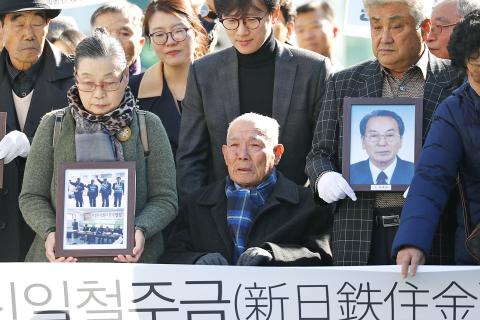South Korea’s top court yesterday ordered a Japanese steel giant to pay compensation over forced wartime labor, triggering a new row between the two US allies and a denunciation by Japanese Prime Minister Shinzo Abe.
Yesterday’s ruling marks the final South Korean chapter in a 21-year legal battle against Nippon Steel & Sumitomo Metal.
The Supreme Court upheld a lower court ruling that the firm pay each of four plaintiffs — only one of whom is still alive — 100 million won (US$88,000) for being forced to work at its steel mills between 1941 and 1943.

Photo: EPA
The sole surviving claimant, Lee Chun-sik, now in his mid-90s, attended the hearing in a wheelchair and was visibly overcome after the ruling.
“I’m just very sad that I am the only one remaining,” Lee told reporters, teary-eyed and choking.
Two South Koreans initially brought the case to a Japanese court in 1997 seeking damages and unpaid wages for forced labor at steel mills owned by a predecessor company of Nippon Steel.
Japanese courts dismissed the case, saying their right to sue had been extinguished by the 1965 treaty which saw Seoul and Tokyo restore diplomatic relations and included a reparations package of about US$800 million in grants and cheap loans.
However, the victims — along with two others, including Lee — launched a separate action in South Korea in 2005.
In 2012, the Supreme Court in Seoul ruled that the company was liable.
Yesterday’s decision dismissed Nippon Steel’s final appeal over the amount of the award.
No further appeal is possible in the South Korean courts.
Abe criticized the ruling, saying it was “impossible” under international law and that the issue had been “completely and finally settled” by the 1965 treaty.
“The Japanese government will deal firmly with this issue,” Abe told lawmakers in Tokyo.
Japanese Minister of Foreign Affairs Taro Kono summoned the South Korean ambassador to protest the ruling and said that Tokyo would bring the case to an international court “if appropriate measures are not taken immediately.”
The ruling “could have a negative impact on the Japan-South Korea relationship,” Kono said, adding that he hoped Seoul would take action to avoid that.
Nippon Steel called the court decision “deeply regrettable.”
It would “carefully review” the ruling, it said, “taking into account the Japanese government’s responses on this matter and other factors.”
Authorities in Seoul, who need to tread a line between popular resentment of Japan’s past action and diplomatic ties with Tokyo, issued a carefully worded statement.
The government “respected” the court ruling, the South Korean prime minister’s office said, and was “saddened by the pain the forced labor victims had to endure.”
“The government hopes to improve South Korea-Japan bilateral relations in a future-oriented manner,” it added.
According to official Seoul data, about 780,000 Koreans were conscripted into forced labor by Japan during the 35-year occupation, not including the women forced to work in wartime brothels.

SECURITY: As China is ‘reshaping’ Hong Kong’s population, Taiwan must raise the eligibility threshold for applications from Hong Kongers, Chiu Chui-cheng said When Hong Kong and Macau citizens apply for residency in Taiwan, it would be under a new category that includes a “national security observation period,” Mainland Affairs Council (MAC) Minister Chiu Chui-cheng (邱垂正) said yesterday. President William Lai (賴清德) on March 13 announced 17 strategies to counter China’s aggression toward Taiwan, including incorporating national security considerations into the review process for residency applications from Hong Kong and Macau citizens. The situation in Hong Kong is constantly changing, Chiu said to media yesterday on the sidelines of the Taipei Technology Run hosted by the Taipei Neihu Technology Park Development Association. With

CARROT AND STICK: While unrelenting in its military threats, China attracted nearly 40,000 Taiwanese to over 400 business events last year Nearly 40,000 Taiwanese last year joined industry events in China, such as conferences and trade fairs, supported by the Chinese government, a study showed yesterday, as Beijing ramps up a charm offensive toward Taipei alongside military pressure. China has long taken a carrot-and-stick approach to Taiwan, threatening it with the prospect of military action while reaching out to those it believes are amenable to Beijing’s point of view. Taiwanese security officials are wary of what they see as Beijing’s influence campaigns to sway public opinion after Taipei and Beijing gradually resumed travel links halted by the COVID-19 pandemic, but the scale of

A US Marine Corps regiment equipped with Naval Strike Missiles (NSM) is set to participate in the upcoming Balikatan 25 exercise in the Luzon Strait, marking the system’s first-ever deployment in the Philippines. US and Philippine officials have separately confirmed that the Navy Marine Expeditionary Ship Interdiction System (NMESIS) — the mobile launch platform for the Naval Strike Missile — would take part in the joint exercise. The missiles are being deployed to “a strategic first island chain chokepoint” in the waters between Taiwan proper and the Philippines, US-based Naval News reported. “The Luzon Strait and Bashi Channel represent a critical access

Pope Francis is be laid to rest on Saturday after lying in state for three days in St Peter’s Basilica, where the faithful are expected to flock to pay their respects to history’s first Latin American pontiff. The cardinals met yesterday in the Vatican’s synod hall to chart the next steps before a conclave begins to choose Francis’ successor, as condolences poured in from around the world. According to current norms, the conclave must begin between May 5 and 10. The cardinals set the funeral for Saturday at 10am in St Peter’s Square, to be celebrated by the dean of the College